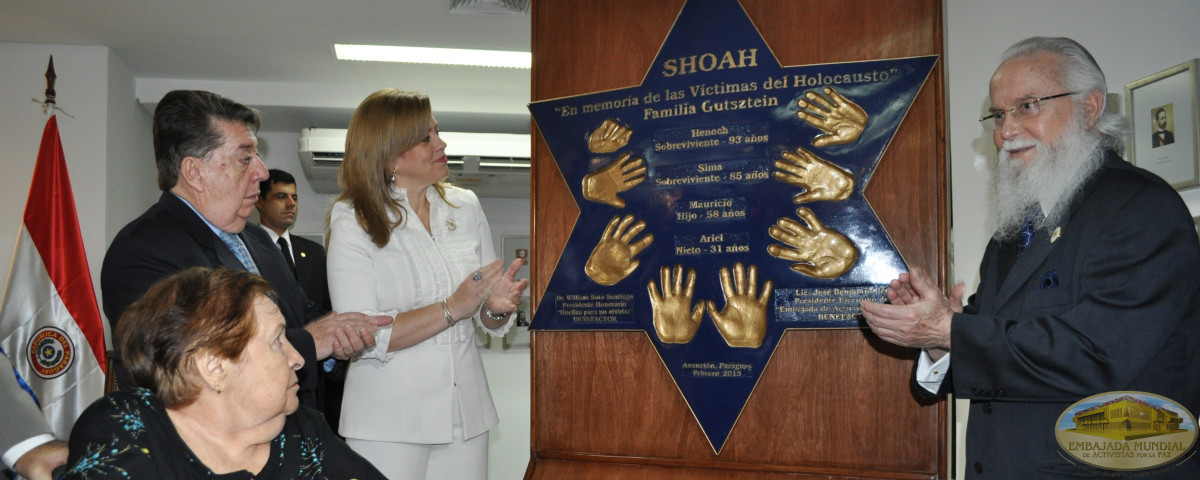
Dr. William Soto | SPEECH GIVEN AT THE MINISTRY OF FOREIGN AFFAIRS
Her Excellency, the First Lady of the Republic of Paraguay, deputy Emilia Alfaro de Franco; His Excellency, the Minister of Foreign Affairs, José Félix Fernández; Honorary Consul of Israel in Paraguay, Max Haber; Holocaust survivors Enoch and Sima Gutsztein; and the Minister of Defense; Minister of Education and Culture; Minister of Health; members of the diplomatic body accredited to the Republic; national authorities; leaders of various Jewish organizations; ladies and gentlemen, good morning.
I am deeply grateful to the Office of the First Lady, the Tesape'a Paraguay Association, and the Ministry of Foreign Affairs for embracing the project Traces to Remember.
This project is part of a program that our organization, the Global Embassy of Activists for Peace, has undertaken in defense of human rights and peace; it has already been successfully received in Colombia, Panama, and Argentina, and it has a proactive rather than reactive goal, it is preventive rather than reparative.
Its purpose is to create reflection about the fact that genocide has been constant throughout history, that bloody wars and massacres have occurred in every corner of the planet, which leads us to think that something like this can happen again at any time and against any human group.
There have been genocides in Africa, Asia, and the Americas, but the genocide that occurred in Europe during World War II against gypsies, homosexuals, Jehovah's Witnesses, and especially against Jews, is different due to the amount of resources and people devoted to the destruction of human lives, the number of mechanisms that were devised, the industrialization of death, the sophistication and the degree of perversion that was reached, and the fact that it was perpetrated by the Nazis in Germany, one of the most educated countries in the world.
Your country, Paraguay, also has in its memory the War of the Triple Alliance and the near extermination of its population, which, according to some historians, decreased from 1,300,000 people in the nation to 200,000 people who survived the conflict, and its army of 100,000 soldiers decreased to 400. Not to mention that before the war, Paraguay showed promise for remarkable industrial development. It was the only Latin American nation that had no foreign debt because its own resources were sufficient, and it was also the first South American country to have a railroad.
To date, it has been the deadliest war in Latin America, considered by many historians to be the American genocide; however, it left us with the example of a noble and generous gesture from the government of Colombia, which offered citizenship to all the Paraguayans who entered its territory.
Something entirely different happened in 1939 when the St. Louis ship left Hamburg with about a thousand passengers—mostly refugee Jews fleeing Nazi persecution—and was not allowed to land in Cuba or the United States, instead being forced to return to Europe to deliver its passengers directly to the gas chambers.
However, we want to convey to the men and women within reach of our voice something like the example of Colombia, because too often silence becomes an accomplice to oppressors, and evil spreads without limits.
It is inevitable to wonder what would have happened if other countries in the Americas had expressed their disapproval regarding the war, or if they had sided with Paraguay. The most logical conclusion is that perhaps the war would have been avoided or it would have ended much earlier.
It is necessary to be more than supportive; it is necessary to be an activist for peace and promote a change in attitude: to not be passive in the face of aggression nor allow others to deny the Holocaust or forget its victims.
Traces to Remember seeks to preserve the testimony of survivors as a way to counteract those who intend to deny the Holocaust, and also to promote the actions of good men and women to monitor the signs of Judeophobia and xenophobia, to be alert to racial slurs, and to condemn aggression.
The invitation is to make peace our flag, and with our voices, to create a barrier against segregation and hatred.
Thank you very much.